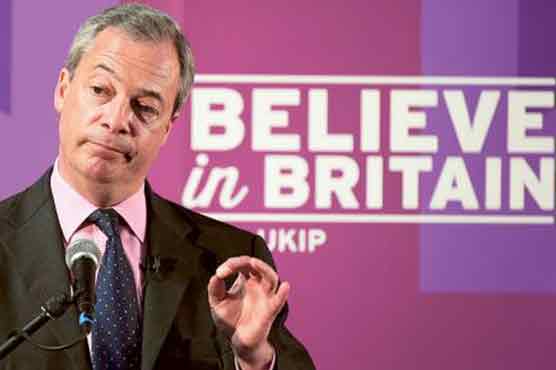Britain's anti-EU party UKIP riven with infighting

The row prompted the departure of two senior advisers to the party.
LONDON (AFP) - A week after an election in which it won the third-biggest share of the national vote but just one seat in parliament, Britain s UK Independence Party is tearing itself apart in spectacular fashion.
First there was charismatic party leader Nigel Farage s short-lived resignation, then a big fallout over finances and on Thursday a stunning attack on him from the head of his election campaign.
In an interview with The Times, Patrick O Flynn said Farage was a "snarling, thin-skinned, aggressive" man who was making UKIP look like a "personality cult".
He called for "a much more consultative and consensual leadership style" and described the events of recent days as a "fiasco" for the party, which is against mass immigration and European Union membership.
He later said he was not planning a "coup" against Farage, adding: "He is my political hero and will remain so and he s done amazing things."
But the row prompted the departure of two senior advisers to the party and Stuart Wheeler, a former party treasurer and a major donor, urged Farage to step down.
"The type of campaign that s now needed has to be slightly less aggressive and more towards winning over people in the centre," Wheeler told BBC Radio 5 Live.
Farage played down the comments as "people letting off steam" and insisted that a leadership contest would be an error.
"The level of support for me in the party is phenomenal and frankly, to go through a leadership contest... would be a massive, massive mistake," he said on BBC debate show Question Time.
A series of senior figures in the party quickly declared their support for Farage, with deputy leader Paul Nuttall calling him "the best communicator in British politics".
Sensible and correct
The party, which came first in last year s European Parliament elections, won 12.6-percent in the general election -- nearly four million votes -- and took control of Thanet council in southeast England.
In the 2010 election it had only won 3.1 percent.
But the outspoken 51-year-old Farage failed to take the Thanet South constituency in what was his seventh attempt to win a seat in the House of Commons.
He had promised to resign as leader of the party if he did not win a seat and promptly did so on Friday.
The decision was abruptly reversed on Monday, however, when the party rejected the resignation and congratulated Farage on a campaign "success".
UKIP s only seat is that of Douglas Carswell, a former Conservative MP who switched last year and who is seen as a potential future leader of the party.
Carswell clashed with the leadership earlier this week over funding, accusing UKIP officials of seeking to claim more public money than needed for the party.
The MP is entitled to take GBP 650,000 (898,000 euros, $1.0 million) of taxpayers money because of the party s large popular vote and he was reportedly urged by UKIP officials to hire up to 15 assistants.
Carswell has said it would be "completely inappropriate" to take the money out of principle, sparking rumours of a rift, though the MP has insisted he remains "staunchly and proudly UKIP".
Farage joined UKIP in 1993 as a founding member and was first elected to the European Parliament in 1999.
He became UKIP s leader in 2006 and helped boost the party s popularity while making it more presentable by rooting out ties to the far-right and outspoken racists.
The rise of UKIP was a key factor in pushing Cameron to promise a referendum on Britain s EU membership by the end of 2017, which has rattled Britain s European partners and the business community.
UKIP founder Alan Sked, a professor of international history at the London School of Economics university, told AFP after the election that Farage had turned the party into an "extreme" political organisation.
"I think he should go as soon as possible," Sked said of Farage to Sky News on Thursday. "He s unelectable."

